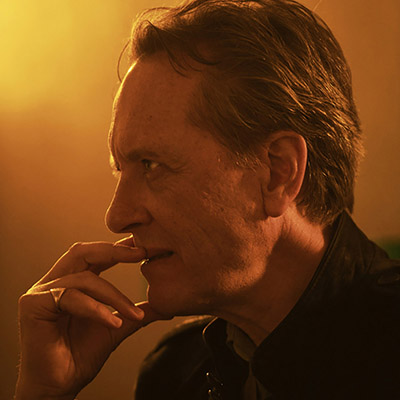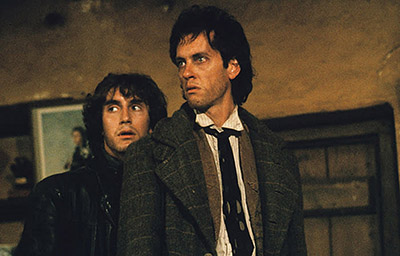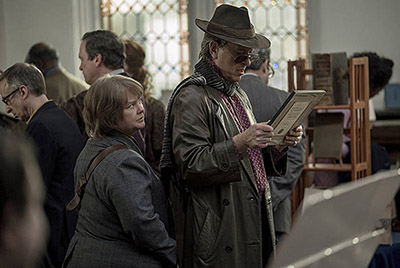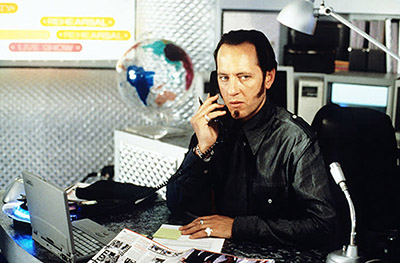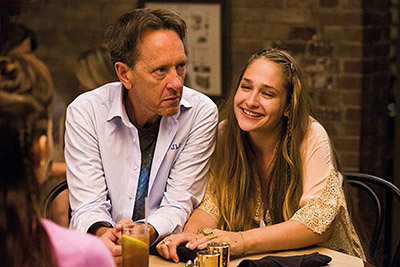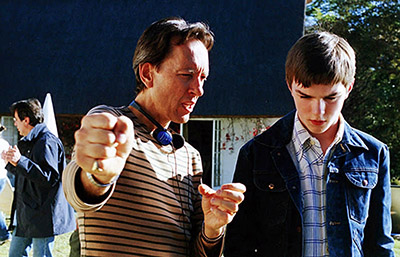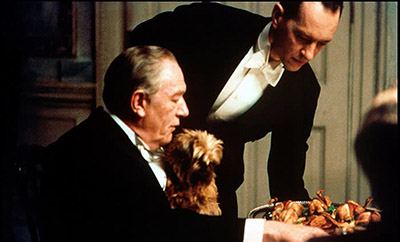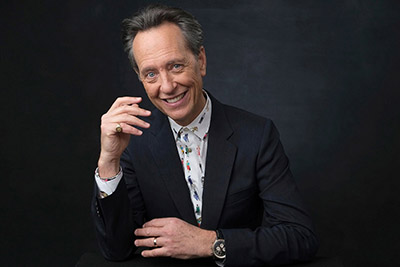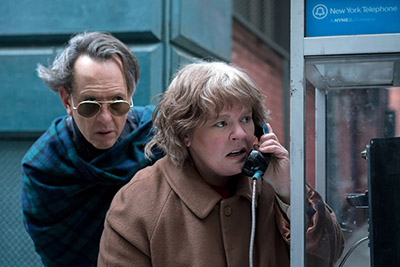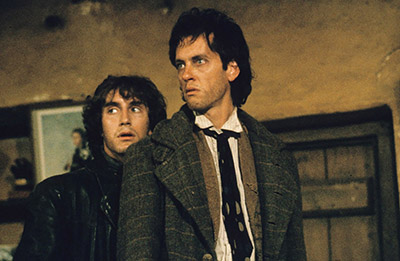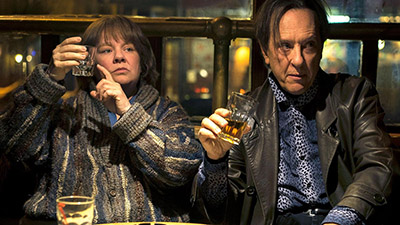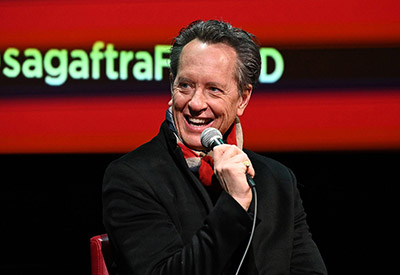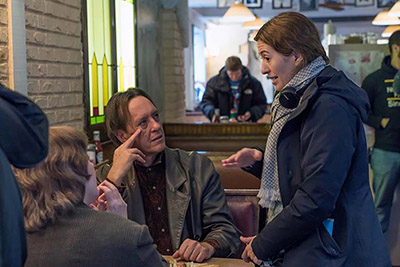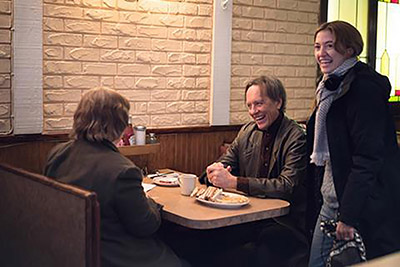Richard E. Grant On How To Survive Awards Season With Flair
Variety.com – 18th February, 2019
By Rebecca Rubin
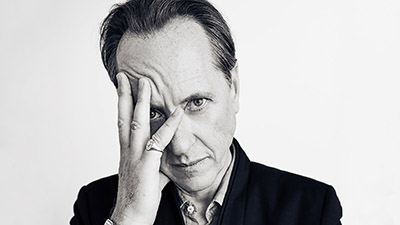 Richard E. Grant Variety Facetime Interview.
Richard E. Grant Variety Facetime Interview.Photo credit: Martin De Boer for Variety.
An Oscar would certainly be nice, but Richard E. Grant doesn’t need a golden statue to walk away from this awards season as a winner.
The 61-year-old actor landed his first Academy Award nomination for his portrayal of Jack Hock, the loyal accomplice of author-turned-literary forager Lee Israel (Melissa McCarthy) in the biopic “Can You Ever Forgive Me?”
Unlike most actors who become jaded by the grind that comes with awards season — its punishing schedule of screenings, interviews on late night shows, and grip and grins — Grant isn’t taking a single moment for granted.
Instead, the veteran is fully embracing the ride, using the long hours spent at industry events as a chance to mingle with his favorite celebrities and meet fans. His social media platforms have become an endearing window into the glitz and glamour of Hollywood, one that lets his 200,000 followers accompany him as he navigates through the perils of awards season with aplomb. When Grant isn’t posting selfies with the likes of Lady Gaga, Bradley Cooper, Emily Blunt, and Timothee Chalamet, he is perfecting the art of photo collages and sharing charming videos that capture his genuine pleasure in being invited to the big show.
Ahead of the Academy Awards, Variety spoke with Grant about cruising through awards season, Barbra Streisand, and why he doesn’t have an Oscar speech prepared.
Why do you think everyone has loved watching you navigate awards season?
Goodness me. You’d have to ask somebody else. I never had advice on this other than my daughter, who said to me, ‘This is so extraordinary what is happening to you — tweet and Instagram about it.’ She’s taken these little 30 second video clips and I posted them, and I’ve been completely astonished how much they’ve been picked up. I suppose like anything in life, if you do it straight from the heart, it will connect with people. I’ve seen on Twitter and Instagram that people have said, ‘You’re responding like we would respond.’ You know, people who are not in show business, if this was happening to them. That seems to be the thing that has connected with people.
Can you take me through your what your typical day is like?
It essentially started four months ago when the movie screened in Telluride for the first time. I had 10 days at home around Christmastime and from then on, I’ve been between New York, San Francisco, London, and Los Angeles doing Q&As after screenings, press events, chat shows every single day.
Say there’d be a photoshoot for two hours, then a lunchtime screening Q&A with SAG members or Academy members or BAFTA members, then another press meeting with a journalist at 4 p.m. Then usually in an evening, it was two screenings, which I didn’t sit through because I had to go from one Q&A to another in a different part of the city.
I’ve had a schedule that has been unlike anything I’ve ever experienced in my whole life before, and I’ve hugely enjoyed it. Because I had nothing to compare it to — I’ve never had this before and I’m quite sure it will never happen again — the entire experience has been one of genuine amazement to me that people have a) turned up and b) had such a positive response to me.
These events involve a lot of schmoozing, but you are allergic to alcohol. How does one survive a cocktail party without a cocktail?
What you don’t know, you don’t miss. When I was 17 years old, I discovered that I’m allergic to alcohol. I’m told the advantage is you don’t wake up the next day with a hangover. I felt like I’m supercharged Duracell battery that just keep on going and hasn’t tired at all. Having said that, after the BAFTAs, I slept for 14 hours straight through, which I don’t remember ever doing in my entire life. It obviously cumulatively takes it out of you, but your adrenaline keeps you going through all these events at parties and the schmoozefest that it involves.
What does a day off look like?
I’ve been at home with my wife, I’ve mowed the lawn, gone shopping, put stuff in the washing machine — all the usual things in life as opposed to living in a hotel and knowing from 9 in the morning to 9 or 10 at night that you’re going from one press appointment to another. That’s been extraordinary and I’ve met such a wide variety of people. I’m not for one nanosecond seeing the blues about this process. I’ve absolutely loved it.
Do you have any good-luck charms or rituals before awards shows?
No, because I’m not superstitious at all. It happens every year that I’ve been observing awards shows, there’s usually an actor that has a surefire through run. Last year, it was Gary Oldman and Frances McDormand. Usually, there’s one actor that’s like roadrunner and just burns the way through everything. I happen to be in a category this year and Mahershala Ali has won absolutely every big award. And as sure as I am talking to you right now, he will win on Sunday. Knowing that means essentially you don’t have to prepare a speech. I’ve been so awarded by the job offers I’ve had, winning 22 critics awards across Canada, USA, and England, I can’t say I’ve been shortchanged in the awards department. The big four — SAG, Golden Globes, Critics Choice, and Oscars — Mahershala has so clearly won those without any doubt that it’s in some way, it makes it easier. The other four nominees, we’ve shared this with each other, you know who is going to win so essentially you enjoy it for the ride it offers. The nerve-wracking thinking — ‘Gee could you or will you win?’ — is taken out of the equation.
Does that mean you’re not going to have a speech planned on Sunday?
Most certainly not. That would be foolish. The man that has to have the speech planned is the man who has had to come up with four different speeches for the four different awards that he’s already won. He’s the one with the duty of coming up with saying something new, not the other four nominees.
You never know…
Oh, you know. The law of averages, if you don’t think so yourself, the bookies, the internet, Google alerts, the world tells you. It just wouldn’t happen.
What has been the most surreal experience that has directly come out of awards season?
Two things. Going to the Governors Ball and while speaking to Emily Blunt for the first time in my life, being interrupted from behind by Tom Hanks saying, ‘You’re perfect in your movie, you’re wonderful, you should win everything.’ That takes you by surprise. Standing directly next to Tom Hanks was Steven Spielberg. Then someone tapped me on the shoulder and said, ‘Do you want to meet Lady Gaga?’ That was completely unbelievable.
I also had a morning off two weeks ago and I drove up with my wife to Malibu and parked outside Barbra Streisand’s gate. I took a selfie, I asked permission of the security guard, and then posted a letter that I had written when I was 14 years old. I then got a reply via Twitter the next day. That is something that I never ever thought could or would happen. Those two things have absolutely stood out. But what I’ve been overwhelmed by is the generosity of American actors and the American public toward me as a foreigner. That has completely overwhelmed me, and I’m so grateful for it.
How would you react to meeting Barbra Streisand now?
[Laughs] Goodness me. My heart just started pumping the moment you even suggested that. I heard a rumor she’s presenting one of the honorary awards at the Oscars. If I get the chance to be in her line of view, that would be extremely pleasing.
If you end up running into her at the Oscars, are you going to take a selfie with her?
I don’t know if she’d even allow it but yes, why not? As long as it’s from her left side. That’s a pre-condition of her entire career, that she’s shot from her left side because she believes it’s her best side.
What’s the most surprising anecdote you’ve told that people have latched on to?
I was in London and it was lunchtime here, and I just finished eating with my daughter at a restaurant in Notting Hill. She had the live feed of Oscar nominations on her iPhone, and we each had an earpiece in. I then posted a 29 second video standing outside the first apartment that I ever rented in London 36 years ago when as an out of work actor as a waiter. That went viral and had 3.5 million views. I can’t even get my head around that. The fact that people responded in a way that they did to that absolutely astonishes me. I’ve probably met 1,000 people in my life probably or no, 500, and I’m friends with 60. To have that response from something that isn’t a movie, it’s just something that you personally posted online, that has been the most extraordinary thing that’s happened through this whole process.
When did you start to notice how much people love your social media presence?
People stop me in the streets or people tweet at me or Instagram message me. From that, because it’s so immediate, you get a sense of something happening. When that video was on various news channels I thought, ‘Wow, most times people only get on the news when they die or they’ve crashed a car or were in a drug bust.’ That this thing has come out of something positive seems pretty unique to me.
What did you learn from working with Melissa McCarthy?
She is so honest and accessible. There’s no subterfuge, you don’t feel any sort of careerism on her part. She’s so 100% there for the character that she’s playing and the movie that she’s done. It’s a real reflection of what a kind and genuinely passionate person she is. That is why she connects so strongly with audiences. I’ve been in restaurants with her and walked down the street with her, I’ve been at screenings, and she touches people in a way that seems absolutely profound. She, as a person, just seems to radiate and connect with people that very few people I’ve come across with in my life do.
How does awards season compare to shooting a Star Wars movie?
One is an entirely public exercise in connecting with people, and the other is a complete closed signed, sealed, delivered world unto itself that is completely private.
Are both worth it?
You bet.
 The REG Temple is the official website for actor, author and director Richard E. Grant.
The REG Temple is the official website for actor, author and director Richard E. Grant.

